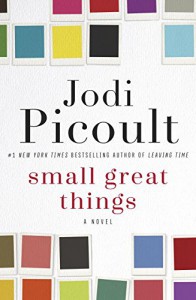Book Review: Small Great Things by Jodi Picoult

I often struggle to figure out my role as an ally, to figure out if I’m supposed to be doing something or if I’m not doing something I should. I’ll be the first to admit that I am ignorant about a lot of things… unfortunately social justice isn’t something that’s taught in school. It’s left up to your parents or peers to instruct you in the way of being a decent human being, something that not all parents are inclined to be or teach.
Strange enough, I identified with Turk in this book. Now before you get your panties in a bunch, please let me explain. My family is perhaps not as vocal as these white supremacists in America, but I immediately found their behaviour familiar. My dad is the perfect Aryan, and I grew up listening to how black people were hardly better than baboons. It would have been so easy for me to buy into what I was taught from as young as I could remember… and indeed my sisters are happily racist today. But unfortunately for my family, I was a rebellious teenager (shocker). When I was forbidden to have black friends, I specifically sought out the only black girl in my class and befriended her. That may still sound horribly racist to many people, but it was a first step to my own awakening.
I am a product of my upbringing, and I still have a lot to learn, but I have spent most of my life questioning what my parents and others would have taught me, and I have worked hard to break away from their mentality of hate. This book called me out on a lot of my own bullshit, though. Like the fact that I don’t “see color” or am in the slightest bit racist. Sure, that’s what I tell myself and that I’d like to believe, but just like Kennedy, am I maybe trying too hard? Isn’t that it’s own brand of racism? And I guess, just like Kennedy, I’m making this review about me… Like I said, I still have a lot to learn.
In the author’s note at the back of this book, Jodi Picoult explained why she wrote the book and said that she expects push-back from it. I know this book wasn’t perfect, but I hope she didn’t get too much smack, because I needed this book and I really think she did a good job of providing a platform, and giving a voice to what black people still experience today. She definitely did a pretty good job of identifying white privilege and implicit racism.
“When it comes to social justice, the role of the white ally is not to be a savior or a fixer. Instead, the role of the ally is to find other white people and talk to make them see that many of the benefits they’ve enjoyed in life are direct results of the fact that someone else did not have the same benefits.” – Jodi Picoult
Some of the things that happened to Ruth and the other black people in this book really breaks my heart, because even though I live in South Africa and it’s predominantly black, I know for a fact that SA is not that different from America. I have friends who are followed at the store to make sure that they don’t steal, whereas I am not. I have friends who are criticized for wearing their hair naturally curly. I have friends who are stared at in the street when their loved one’s skin tone doesn’t match their own. I have a father who scorned my sister-in-law’s new born baby because he was half black, and that “poor child”…
This was a difficult book to read, and I’m guessing a lot of people won’t like it. Most will be legitimate reasons like not liking the writing style or various other reasons people don’t like other books. But I think there will also be people who will not be able to accept this message as true, people who will resent the agenda. Rome wasn’t built in a day, so for those people, I hope a seed will have been planted. A seed is all that’s necessary to start a garden…
The end of this story was perhaps a little whimsical and too idealistic, but it resonated with me because at the end of the day, there is always hope. Hope that people can be better, that humanity can be better… It’s unlikely, but if you don’t have hope, then what is the point of even trying?
“People must learn to hate, and if the can learn to hate, they can be taught to love.” – Nelson Mandela
 4
4





